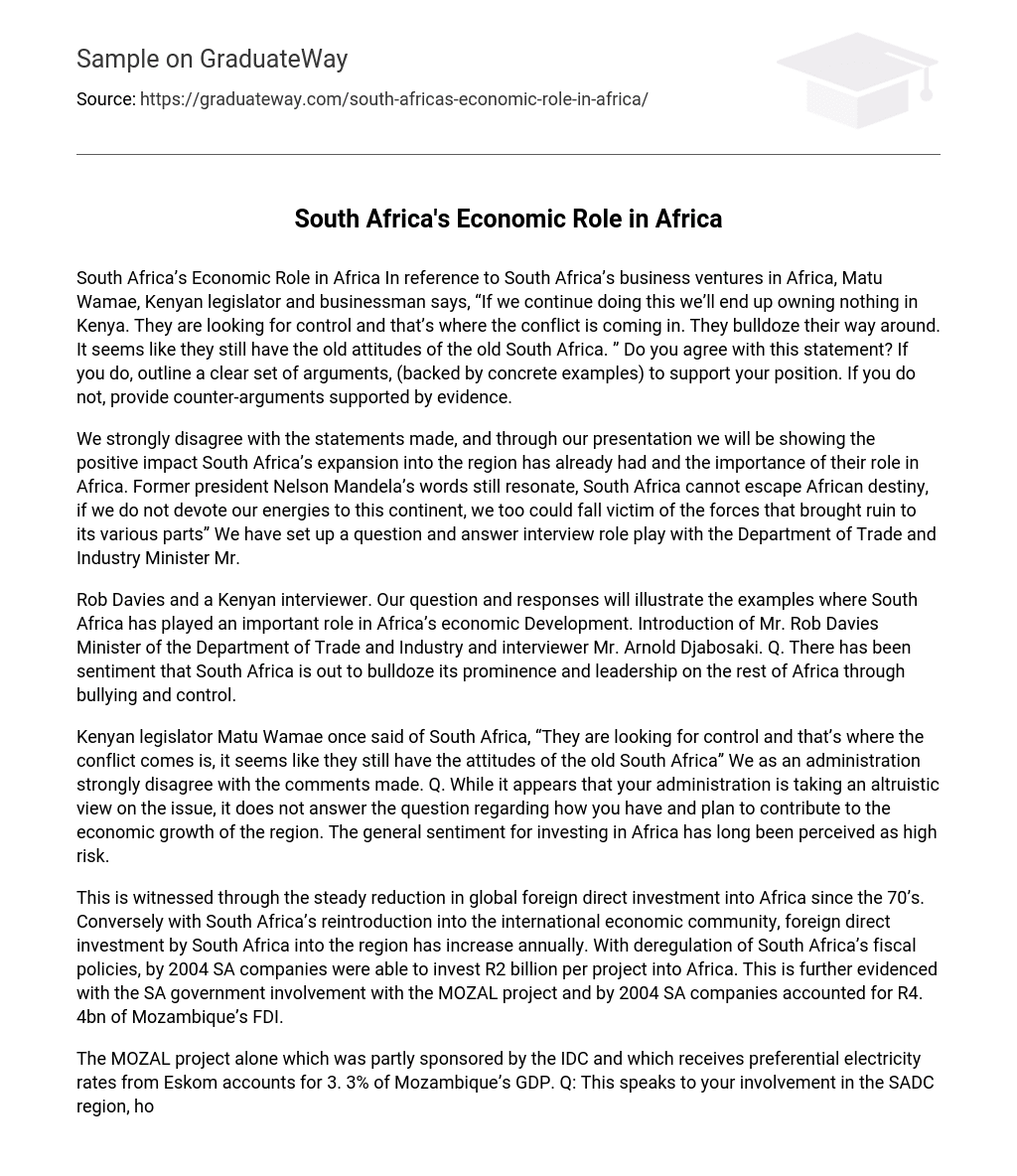South Africa’s Economic Role in Africa In reference to South Africa’s business ventures in Africa, Matu Wamae, Kenyan legislator and businessman says, “If we continue doing this we’ll end up owning nothing in Kenya. They are looking for control and that’s where the conflict is coming in. They bulldoze their way around. It seems like they still have the old attitudes of the old South Africa. ” Do you agree with this statement? If you do, outline a clear set of arguments, (backed by concrete examples) to support your position. If you do not, provide counter-arguments supported by evidence.
We strongly disagree with the statements made, and through our presentation we will be showing the positive impact South Africa’s expansion into the region has already had and the importance of their role in Africa. Former president Nelson Mandela’s words still resonate, South Africa cannot escape African destiny, if we do not devote our energies to this continent, we too could fall victim of the forces that brought ruin to its various parts” We have set up a question and answer interview role play with the Department of Trade and Industry Minister Mr.
Rob Davies and a Kenyan interviewer. Our question and responses will illustrate the examples where South Africa has played an important role in Africa’s economic Development. Introduction of Mr. Rob Davies Minister of the Department of Trade and Industry and interviewer Mr. Arnold Djabosaki. Q. There has been sentiment that South Africa is out to bulldoze its prominence and leadership on the rest of Africa through bullying and control.
Kenyan legislator Matu Wamae once said of South Africa, “They are looking for control and that’s where the conflict comes is, it seems like they still have the attitudes of the old South Africa” We as an administration strongly disagree with the comments made. Q. While it appears that your administration is taking an altruistic view on the issue, it does not answer the question regarding how you have and plan to contribute to the economic growth of the region. The general sentiment for investing in Africa has long been perceived as high risk.
This is witnessed through the steady reduction in global foreign direct investment into Africa since the 70’s. Conversely with South Africa’s reintroduction into the international economic community, foreign direct investment by South Africa into the region has increase annually. With deregulation of South Africa’s fiscal policies, by 2004 SA companies were able to invest R2 billion per project into Africa. This is further evidenced with the SA government involvement with the MOZAL project and by 2004 SA companies accounted for R4. 4bn of Mozambique’s FDI.
The MOZAL project alone which was partly sponsored by the IDC and which receives preferential electricity rates from Eskom accounts for 3. 3% of Mozambique’s GDP. Q: This speaks to your involvement in the SADC region, however South Africa’s arrogance has been well documented with businesses like Vodacom moving into foreign markets specifically with their attempted move into Nigeria a few years ago. We cannot ignore the difficulties of doing business in Africa and with the fledgling forays by South African companies into international markets we can expect a few hiccups along the way.
If we however look at the other side of the coin, you had MTN finding the recipe for success in the African market where they now have a strong presence in Nigeria and have contributed well to GDP growth as well as employment opportunities in the country. An industry analyst from Scott &Sullivan said, “Doing business in Africa remains tricky, particularly when dealing with partners aligned to political leaders or the government”. The way forward with this is to ensure that the successful companies share their intellectual capital and know-how of the region with companies looking to increase their footprint on the continent.
Q. It has been argued that South African Companies have a procurement system that undermines the country in which it operates. Companies purchase their inventory from SA as apposed to sourcing local produce? What are your comments? We have to understand that some countries are not equipped to sustain the production demands of these companies. It is often difficult to source fresh produce from the local communities. Some South African businesses are however prioritizing the use of locally sourced produce.
A case in point is SABMiller who identified Cassava as a prominent crop grown primarily by subsistence farmers. They have started integrating this into the production of country specific beers. Namely “Impala” in Mozambique and “Eagle” in Ghana. When Shoprite first opened in Zambia in 1995 it had to import all its fresh produce. “Today 80% of all the fresh produce sold in their stores in, come from Zambian producers. Q. As a recently included members of BRICS how can Africa expect to benefit from this partnership?
As our International Relations and Corporations minister stated “Whenever South Africa finds itself in a forum where other African countries are not represented, we do not speak for SA alone but also for all other African countries. Our vision therefore is that through this strategic partnership, we will increase not only our economic prosperity but rather that of the entire continent. Q. It seems like SA’s focus is purely on economic gain? South Africa has documented their foreign policy ideology in The Diplomacy of Ubuntu drafted in 2011.
Herein we clearly outline the values for foreign trade and interaction with Africa. As you have heard South Africa has had many positive business engagements with the African continent. Of course it has been hard and there have been some controversy. Doing Business in Africa remains one of the hardest areas to We believe the facts we have presented shows that South Africa’s economic role in Africa goes beyond its own personal growth. Through the country’s industrial investment we are looking to grow not only our own economy but that of our fellow African nations.





